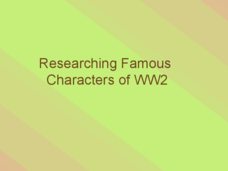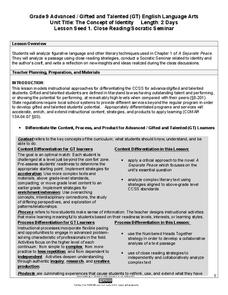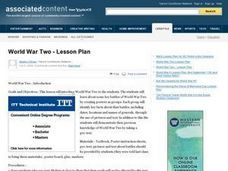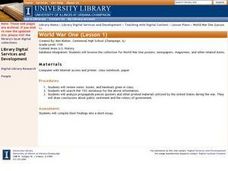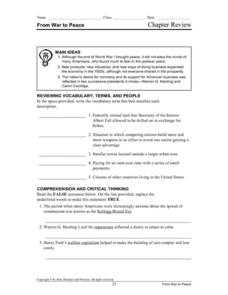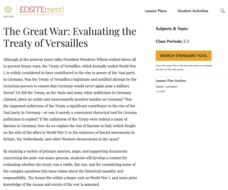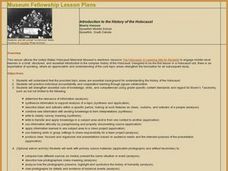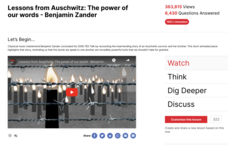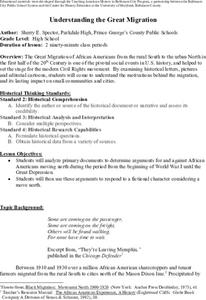Curated OER
Researching Famous Characters of WWII
In collaborative groups, learners will research one of the three famous characters outlined in this presentation. The resource introduces Adolf Hitler, The Royal Family, and Winston Churchill, then asks each group to research and prepare...
US House of Representatives
“‘The Negroes’ Temporary Farewell,” Jim Crow and the Exclusion of African Americans from Congress, 1887–1929
Despite some advances made during the Reconstruction Era following the Civil War, the period from 1887 through 1929, African Americans serving in Congress suffered severe setbacks due to Jim Crow Laws and voter suppression. Class members...
Maryland Department of Education
The Concept of Identity Lesson 1: Close Reading/Socratic Seminar
John Knowles' A Separate Peace provides readers with an opportunity to develop their close reading and analytical skills as they look for what Knowles feels are the factors that shape our identity.
Curated OER
World War I: Overview of the Great War
Ninth graders read first hand accounts of soldiers' lives during World War I, examine historical timeline of major events during war, and research and listen to clips of popular music of the time.
Curated OER
World War II
Students create a Powerpoint presentation covering key information regarding a World War II battle and present the information to the class in the form of an oral presentation. They then will turn in a summary report including two...
Curated OER
World War II Memories
Fifth graders utilize primary sources provided to formulate questions to prepare for an interview. Veterans and civilians who lived during World War II are interviewed by students and their work displayed on a web site.
Curated OER
The White Line - A One Act Play
Students discuss amendments of the Constitution that cover due process and discuss them in relation to the play "The White Line". They determine how national security measures conflict with the issues of due process during wartime. They...
Curated OER
Social Changes in America Caused by World War II
Young scholars research and examine the social changes that occured in the United States during World War II. In pairs they conduct research using a variety of resources, and organize and compose a "Guide to Life" for veterans returning...
Curated OER
World War One- Lesson #1 of 3
Eleventh graders search an online database for World War I posters, newspapers, magazines and other media. They write an essay about public sentiment of the time based on the research.
Curated OER
From War to Peace
In this post World War I worksheet, students review a chapter as they write 5 vocabulary terms that match 5 definitions, change 3 false statements into true statements, and explain 2 historical themes regarding this time period in United...
Curated OER
Events of World War II
Ninth graders examine the main leaders and events of World War II. In small groups they analyze images of main events in WWII, listen to a lecture, and complete a fill-in-the-blank worksheet.
Curated OER
American Foreign Policy Since World War II (The Cold War)
High schoolers identify and interpret some key figures and major events during the Cold War era, including the Korean War, Vietnam, Cuban Missile Crisis, Bay of Pigs Invasion, and the United States and China Cold War Relations. They...
Curated OER
The Great War: Evaluating the Treaty of Versailles
Young scholars examine and evaluate the Treaty of Versailles. They read and discuss primary source documents, explore various websites, develop a list of postwar goals for France, Germany, and the U.S., and evaluate whether the treaty...
Reed Novel Studies
Lily's Crossing: Novel Study
War affects much more than just soldiers. Lily and Albert in Lily's Crossing know that better than anyone as World War II affects both of them in different ways. Scholars use vocabulary words, answer questions, and work with literary...
Curated OER
Survivor Stories
Trace a survivor's story using a timeline, map skills, poetry and/or prose and photography, and make a visual representation of a survivor's journey through his or her life as a culminating activity for the class and the survivor. This...
US National Archives
WWII: Western Europe 1939-45 – Invasion
Without the benefit of history, Western Europe in the 1940's had no idea what was about to befall them. Class members use primary sources, including political cartoons, videos, and internal documents, to analyze how much of a threat...
US House of Representatives
Hispanic Americans in Congress During the Age of U.S. Colonialism and Global Expansion, 1898–1945
To be Puerto Rican, in the words of one politician, is to be "foreign in a domestic sense." Young historians consider the American role in colonialism and its impacts on Hispanic Americans through the first part of the twentieth century...
Curated OER
Freedom by the Fireside: The Legacy of FDR's "Four Freedoms" Speech
Students read and analyze Franklin Delano Roosevelt's 1941 State of the Union Address. They listen to recordings of speeches by F.D.R., answer discussion questions, and participate in a debate.
Curated OER
Introduction to the History of the Holocaust
The Holocaust is unbelievable! Examine this piece of history with your class. Using the Internet, research groups determine the relevance of information presented, compare how different sites present the same information, synthesize...
Weebly
Liberty Theme Park Project
Invite your young historians to demonstrate how the American Revolution truly was one crazy ride after another as they design a theme park! This unique and engaging project prompts learners to consider major events leading up to and...
Curated OER
Using Primary Sources to Study the Holocaust
Engage your middle schoolers with Pastor Martin Niemoller's famous poem that begins, "First they came for the communists." Now that you have their attention, send learners to the various work stations you created to have them explore...
TED-Ed
Lessons from Auschwitz: The Power of Our Words
Some words are best left unspoken. Words matter, according to Benjamin Zander, conductor, teacher, and lecturer. To illustrate his point, Zander recounts a story told to him by a survivor of Auschwitz. As a result of her experience this...
US House of Representatives
Women Pioneers on Capital Hill, 1917–1934
As part of a study of the women elected to Congress from 1917 to 1934, groups research and then design a museum exhibit that describes the life and the congressional service of one of these women.
Center for History Education
Understanding the Great Migration
What would make someone leave home and travel thousands of miles to find another one? Young historians look at letters, demographic data, and artwork to answer the question for the Great Migration, or the movement of thousands of African...


